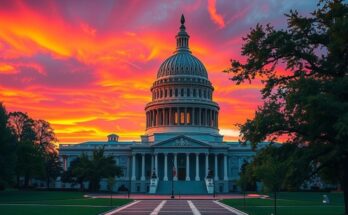John Mahama has made a historic comeback as Ghana’s president after defeating Vice President Mahamudu Bawumia in the recent elections. This victory is significant as Mahama is the first leader to reclaim the presidency in Ghana’s Fourth Republic. His campaign focused on addressing the country’s economic issues, particularly following a debt crisis and a deal with the IMF. Mahama promises reforms aimed at job creation and fighting corruption as he takes office once again.
John Mahama, the former president of Ghana and leader of the opposition National Democratic Congress (NDC), has successfully regained the presidency after two previous failed attempts. His victory in the recent election is historic, as he becomes the first leader to reclaim the presidency since Ghana’s transition to multi-party democracy in 1992. Mahama secured this achievement by addressing the public’s economic frustrations amidst a stark financial crisis that saw the nation defaulting on its debts and negotiating a $3 billion partnership with the International Monetary Fund (IMF).
Mahama, who previously served as president from 2012 to 2017, defeated Vice President Mahamudu Bawumia of the ruling New Patriotic Party (NPP), who conceded defeat shortly after the elections. A focal point of Mahama’s campaign was his promise to “reset” the economy, renegotiate elements of the IMF deal, and develop a “24-hour” economy aimed at job creation, resonating particularly well with the younger electorate.
Born into privilege in northern Ghana, Mahama’s early life was shaped by the experiences of the 1966 military coup which partially influenced his political consciousness. His political background includes serving as a member of parliament and as the chairman of the West Africa Caucus of the Pan-African Parliament. Mahama aims to combat corruption by proposing the establishment of a new office to oversee government procurement exceeding $5 million, addressing a significant source of illicit activity.
Despite these goals, Mahama’s previous presidency was marred by allegations of corruption and a notorious energy crisis characterized by frequent power outages, commonly referred to as “dumsor.” He also highlighted his experience in international crisis management during his tenure, notably his leadership role during the Ebola crisis as part of ECOWAS. Nonetheless, his recent support for an anti-LGBTQ bill passed by Ghana’s parliament has attracted international scrutiny and criticism.
The recent presidential election in Ghana is notable for John Mahama’s remarkable comeback, marking a significant shift in the political landscape of the country. The election occurred against a backdrop of severe economic challenges that Ghana has been facing, including a national debt default and the establishment of an IMF deal, which became central issues during the campaign. Mahama’s ability to connect with voters over economic frustrations played a pivotal role in his victory, as he sought to restore public confidence and propel reforms aimed at economic revitalization. This election is particularly historical as it charts the course for future political dynamics within Ghana’s evolving democratic context, highlighting the tension between the ruling party’s economic management and the opposition’s promises of reform and renewal. Mahama’s path to the presidency is marked by his prior experience and the continuous challenges faced during his previous term, setting a complex stage for his renewed leadership. His proposed policies and the societal issues he hopes to address will be crucial as he moves forward in fulfilling the expectations of the electorate that has once again placed their hopes in his leadership.
John Mahama’s recent electoral victory signifies a historic and unprecedented occurrence in Ghana’s political history, as he becomes the first leader to reclaim the presidency after being ousted. His campaign largely focused on responding to the economic woes troubling the population, which resonated with voters. As he embarks on this new term, Mahama’s pledges to restructure the economy and intensify measures against corruption will be scrutinized, particularly given the challenges of his previous administration. The direction of his leadership will significantly impact Ghana’s immediate future and the overall trajectory of the nation’s democratic governance.
Original Source: www.wfxg.com




